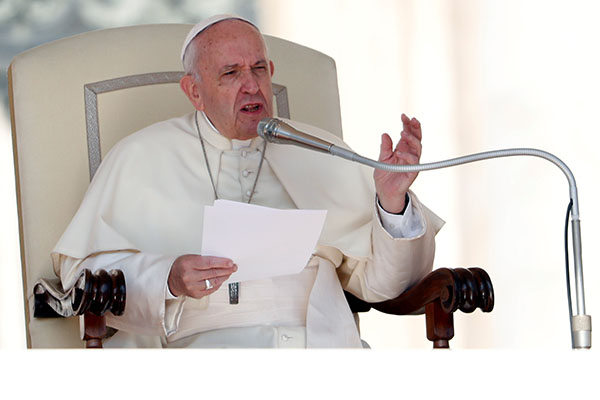
By John L. Allen
(Crux) – In the wake of a recent flap over Pope Francis saying he considers it an honor when “Americans are attacking me,” two U.S. bishops in Rome this week to present the results of a major assembly of Hispanic-American Catholics say their presence delivers a simple message: Not all Americans think alike, and most aren’t anti-pope.
“There are differences of opinion, and Americans are very opinionated, but my overwhelming experience of both bishops and the people is one of great love for Pope Francis,” said Bishop Nelson Perez of Cleveland, Ohio.
Bishop Perez told Crux that when he hears reports of American opposition to the pontiff, “I don’t exactly know what they’re talking about.”
“I understand that there are some factions, but they do not represent what I’ve experienced in Philadelphia, in New York where I was, and now in Cleveland,” Bishop Perez said. “It’s just simply not there. I think there’s great love for the Church and great love for the Holy Father.”
Auxiliary Bishop Arturo Cepeda of Detroit echoed the sentiment.
“My experience … is of people embracing his teachings and the way he models Jesus Christ,” Bishop Cepeda said. “Especially for the Hispanic/Latino community, I think he’s a bridge to us. He’s helped us understand better who we are and what we need to be.”
“I see complete support for the Holy Father,” Bishop Cepeda said in an interview with Crux on September 17.
Bishops Perez and Cepeda are in Rome as part of a delegation that also includes Archbishop José H. Gomez of Los Angeles, vice president of the U.S. bishops’ conference, to present Vatican officials with the results of the “V Encuentro,” a national assembly of Latino/Latina Catholics in the U.S. that took place in September 2018.
The question of Pope Francis’s attitude toward America and Americans has been in the air since his election in 2013, and was revived earlier this month when the pontiff spoke to a French journalist on a flight from Rome to Mozambique on Sept. 4, during which the journalist presented Pope Francis with his new book titled ‘How America Tried to Change the Pope’ about an alleged effort by American conservatives to sabotage the papacy.
That French journalist, Nicolas Seneze, specifically named EWTN, the multimedia empire founded by the late Mother Angelica, and Canada-based LifeSiteNews, as examples of conservative American backlash against the pontiff.
“It’s an honor that Americans are attacking me,” Pope Francis said in response, adding that the book is a “bomb.”
Six days later, on a return flight from Africa to Rome, the Holy Father was asked about his comments on the U.S., including whether he fears a schism. In response, he said that while he prays a schism won’t happen, he’s not afraid of it either, because there have been schisms throughout Church history.
Bishop Perez, however, downplayed any such concerns.
“Are there some [detractors of Francis]? Yes, there are … I have my own detractors, I’m sure,” he said.
“We have a little bit of everything in America, but by and large I have to say that my experience as the Bishop of Cleveland is of overwhelming support for the pope,” Bishop Perez said.
Bishop Cepeda said it’s been fortuitous that the trip to present the Encuentro results, which was planned well before the recent dust-up over American attacks on the pope, has allowed the bishops to present a different face of the American Church in Rome.
“What I’ve seen from our people is that they began the process probably not knowing exactly what they were getting into,” Bishop Cepeda said. “We invited them, they were so excited, and it was through that process that a number of our community members came to ask, ‘What am I doing? How is God calling me?’”
“That’s part of the process, it’s about discernment and conversion, these are the things Pope Francis wants, and it’s happening,” he said.
Bishop Perez said the timing of the trip, however accidental, may also be providential.
“I think the fact that we’re a delegation of 15 people here, and that we’re talking about the Encuentro as an incarnation of ‘The Joy of the Gospel’ at the very heart of the American Church, says something,” he said, referring to Francis’s 2013 document Evangelii Gaudium, often seen as the Magna Carta of his papacy.
“The fact that we’re even here is a witness,” Bishop Perez said.
Both bishops conceded that fallout from the latest wave of the clerical sexual abuse scandals in the Church, including accusations that Francis himself may have failed to act on allegations regarding ex-cardinal and ex-priest Theodore McCarrick, have left scars in the Hispanic Catholic community too.
“You can’t say it didn’t interfere, but what it did not do was distract,” Bishop Perez said. “It didn’t distract from the purpose, the mission, the excitement of the Encuentro.”
“Actually, what was fascinating to me was that the whole Encuentro process happened at a time when the Church in the United States was in turmoil, and in particular, the bishops,” the 58-year-old said. “The Encuentro was the embrace [of the bishops] by the Catholic people, all of them, and it was a soothing balm.”
Bishop Cepeda said that in general, the Hispanic wing of the Church in the U.S. probably has weathered the storm of the abuse scandals with less long-term damage.
“They’re very much aware of what’s going on,” he said.” We have social media now and so on, so they know, they see the news every day. They’re not denying it.”
“But my experience has been that they continue to be very positive about who we are, and they want to be part of it,” Bishop Cepeda said.
Especially taking into view the one-third of the American Catholic community that’s already Latino/Latina, Bishop Perez said, claims that “Americans” as a whole are anti-Francis don’t hold up.
“I don’t see the generalization of ‘the Americans’ [attacking the pope],” he said. “It’s more multifaceted.”
